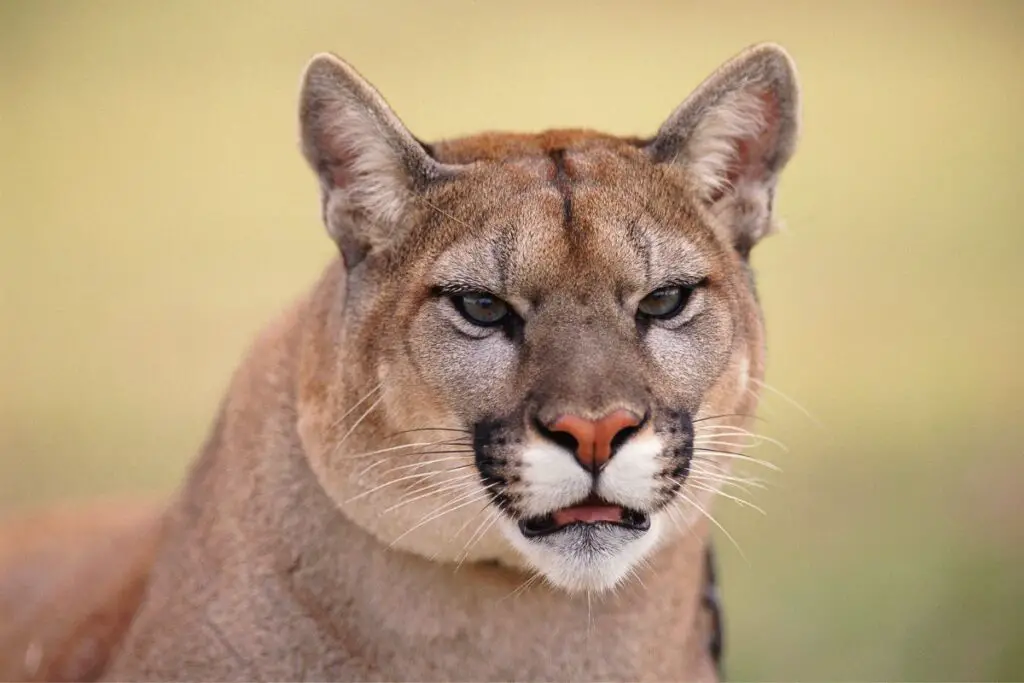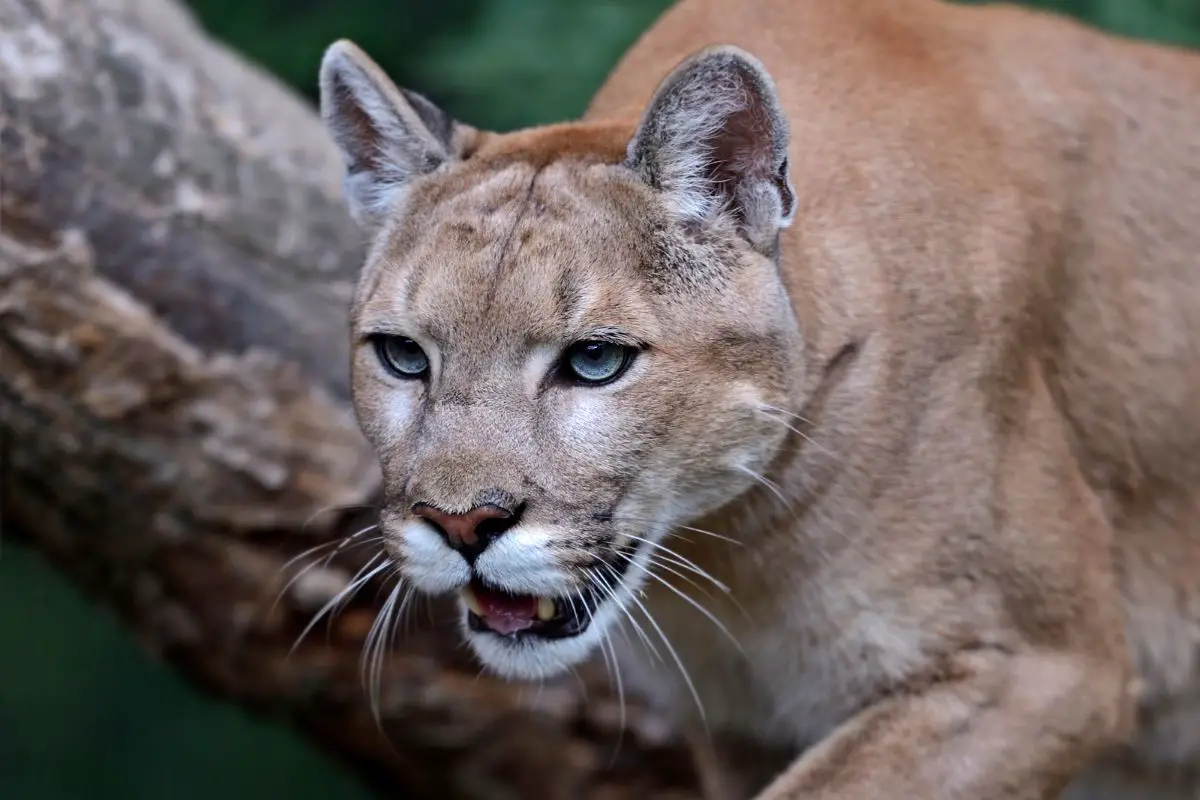Spending time in nature has always been a huge part of my life. I love to be outdoors and in the wilderness. While in the great outdoors, it’s not unusual to see deer trampling through the woods and rabbits high-tailing it across meadows and fields.
However, sometimes there are animals embedded in the landscape that you don’t see. Lurking behind the brush cover and crouching in rocky outcrops, there is a predator unrivaled in the United States, known to most, as the mountain lion (puma concolor).
These large cats are not limited to just the mountains, forests, or remote areas. Facing human development, they have moved into territories that overlap with humans. While they were once elusive creatures that were rarely seen, now we have footage of them on ring cameras, in people’s yards, laying on their boats, and passing through neighborhoods.
To many, this situation poses an important question; are mountain lions dangerous?
Mountain lions are wild animals that are capable of causing harm to humans. While they are dangerous, they do not come into contact with humans that often. They try to distance themselves from too much human activity. When it comes to small pets and livestock, mountain lions can be a threat if they are active in your area.
Mountain lions are large cats that can be found prowling in remote parts of the United States, Canada, and down into Mexico. We’re going to go over what kind of threats mountain lions pose, where they are most active, and what you can do to prevent an encounter with these powerful wild felines.
Decoding Mountain Lion Behavior
Your chances of running into a mountain lion are rare, and this is no accident. Mountain lions are masters of stealth and someone could be within a few yards of one and not even know it.
Most conflict that arises between mountain lions and humans stems from their predation of domestic animals, including sheep, cattle, goats, and horses, among others. This behavior seems to be noted in the name of a one-time proposed subspecies called Felis hippolestes which translates simply into “the cat that kills horses”.
Are Mountain Lions Aggressive?
Mountain lions are hypercarnivores and meat makes up 99% of their diet, so to say that they are aggressive would by no means be incorrect. However, this aggression is most often only directed at their normal prey animals.
Prey animals for the mountain lion encompass a very long list but mostly revolve around white-tailed and mule deer, along with other large ungulates. These larger animals are best to give them the calories they need to sustain themselves, especially in the winter months or while rearing kittens for the females.
Some large carnivores will kill competing predators and not eat them, preferring to eat the meat of herbivores instead. Mountain lions have been known to eat bears, wolves, and coyotes although this is a rare occasion.
Are Mountain Lions Dangerous to Humans?
Mountain lions avoid people to a great extent. The reality of this fact makes your odds of spotting one very distant and your odds of encountering one even less. However, it’s still better to stay vigilant.
Asking whether or not mountain lions are dangerous to humans is really no question at all, of course, they are dangerous. However, to be hurt by a mountain lion you would first have to be attacked by one. With only 126 mountain lion attacks on people reported over the last hundred years, this circumstance is rare indeed.
Why Do Mountain Lions Attack People?
Attacks on people by mountain lions can come from someone inadvertently coming too close to a lion’s den and subsequently their kittens. While this may be one explanation, it is probably the least likely. This is because they make their dens far away from where people would normally travel, even while hiking.
Another cause for mountain lions to attack people is coming between them and their recent kill. They will defend their meal most aggressively whether it be from a bear, wolf, coyote, or a person.
Most deaths caused by mountain lions have been children. The obvious reason is that, when confronted by a mountain lion, children will run. This triggers the lion’s instinct to give chase.
Once engaged in the pursuit, they will pounce on, and kill the person just like they would any other prey animal. This not only goes for young people but anyone faced with a possible mountain lion attack.

Mountain Lion Encounters: What to Do
Before we start with the “do’s”, let’s begin with the “don’ts”. No matter if you’re on a ski trip, out hiking in the woods, or in your own backyard, when confronted by a possible attack from a mountain lion do not run.
As a good rule of thumb, when out in the wilderness do not go alone. While this practice has many other benefits, it also benefits you if you were to come across a mountain lion.
If you have children with you, do not let them get too far ahead of you and always keep them in sight, if not within reach. Also, do not crouch down, bend over, just stand still, or turn your back on a mountain lion.
What Scares a Mountain Lion Away?
The actions you will take when threatened by a mountain lion serve two purposes. The first is to look the least like a prey animal as possible. Do this by making yourself look as large as possible, standing tall and straight, maintaining eye contact, waving your arms in the air, and making a lot of loud noises.
The other reason for this is to appear to the mountain lion like you may do it some harm. Mountain lions are not likely to risk injury because any substantial injury to a wild animal is almost certain death.
Aside from the aforementioned tactics to scare away a mountain lion, you may also take up arms. Throw rocks, grab a big stick, and pull out your bear spray. Back away slowly, giving them plenty of room to exit the area without turning away or running from them.
Do Mountain Lions Kill Humans
As we stated earlier, encounters with mountain lions are rare. For example, with only 27 fatal attacks over the last hundred years, your odds of being killed by a mountain lion are approximately 1 in 28 million. Compare that with your odds of dying from a fall while hiking in the mountains at 1 in 15,700, or dying from a skiing accident at 1 in 1.4 million.
However, attacks do happen, with some ending in death. If you are unable to deter the mountain lion from attacking, fight back. Many people have been able to fend off a mountain lion attack by putting up a fight.
The mountain lion will employ its standard method of attack by attempting to sever the spinal cord. Protect your head and neck, wrap a jacket around your arm to place in between you and the animal, and fight back with everything you have. You may walk away with severe injuries but preserve your life.
Do Mountain Lions Scream When They Attack?
No, mountain lions do not scream when they attack. Mountain lions possess much the same assortment of sounds as domestic cats with purrs, growls, and hisses.
During the mating season, you can hear their caterwauls and yowls as they attempt to attract a mate. These latter noises can sound much like a woman screaming as though they were being attacked by a ferocious beast.
However, when hunting they exhibit near silence. When engaged in an attack, especially against another predator, you may hear a growl, but most animals that perish from an attack by a mountain lion, neither see nor hear it coming.
Why Are Mountain Lions so Dangerous?
Mountain lions pose a threat to people for the same reasons they are so dangerous to all other animals. Their exemplary hunting skills and physical prowess make them formidable opponents to any animal they face.
Powerful limbs, sharp claws, and crushing jaws combined with speed and agility give mountain lions an edge possessed by few in the animal kingdom.
Which State Has the Most Mountain Lions?
It is difficult to determine with certainty which state has the most mountain lions, as their populations can be difficult to track due to their elusive nature and vast territories. However, according to the Mountain Lion Foundation, as of 2021, the state with the largest known population of mountain lions in the United States is California, with an estimated 4,000 to 6,000 individuals.
Other states with significant populations of mountain lions include Colorado, Montana, Wyoming, and Idaho.
Want to learn more about mountain lions? Check out Mountain Lions vs African Lions!
Are Mountain Lions a Threat: Final Thoughts
Wild animals are always going to act wild. While some pose a greater threat to humans than others, mountain lions are at the bottom of the list. Not because they are the least capable but because they are the least willing.
When it comes to people, they raise less of a threat than domestic dogs or bees, because of how rare an encounter can be. Man is a much greater threat to them than they are to us, and while we should fear them, we should also keep in mind that they live here too.
Additional Sources
Raatma, Lucia, How Do We Live Together Mountain Lions, Cherry Lake Pub., (2010)
- Hero Farm Dog Survives Epic Battle with Coyote Pack - December 9, 2024
- The 10-Minute Bedtime Routine That Changed My Dog’s Sleep Forever - November 29, 2024
- Creating a Safe Space for Nervous Pets: Your Guide to Pet-Friendly Havens - November 25, 2024

